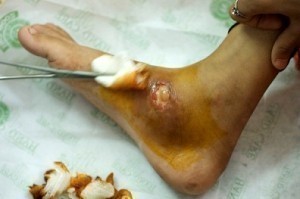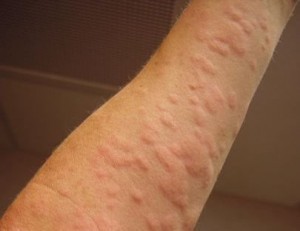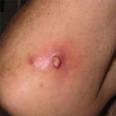Remedies for Boils
Boils are an affliction characterised by a localised infection, deep in the skin. It starts out as a tender, reddened area and develops, with time, into an area that is firm and hard. Eventually the centre of the hardened area will soften and become filled with white blood cells that the body sends to the site and fight the infection. The collection of white blood cells, bacteria and proteins is commonly referred to as pus; this pus forms a head, which can be surgically opened or spontaneously drained out through the surface of the skin.
There are several types of boils which usually occur on the skin, they are
- Furuncle or carbuncle: abscesses in the skin caused by bacteria. Furuncles can have more than one openings onto the skin and is sometimes associated with a fever or chills.
- Cystic acne: is a type of abscess that is formed when oil ducts are clogged and infected. It affects deeper skin tissues than more superficial inflammation from other types of acne. Cystic acne is typically found on the face and occurs during adolescence.
- Hidradenitis suppurativa: is a condition where multiple abscesses are formed under the armpits and often in the groin area, as a result of local inflammation of the sweat glands. This form of infection is difficult to treat with antibiotics alone and typically requires surgical procedure to remove the involved sweat glands to eradicate the inflammation.
Natural Home Remedies for Boils
- Egg whites of hard boiled eggs can be used for treating boils; after boiling and peeling an egg, wet the white and apply it directly to the boil. Cover it with a clean cloth.
- Milk heat a cup of milk and gradually add 3 teaspoons of salt; simmer the milk for ten minutes then add flour or breadcrumbs to thicken the mixture. Divide the mixture into 4 poultices and apply one to the boil every half an hour.
- Nutmeg stimulates circulation in the body which helps it to fight bacterial infections in the boil. Stir ½ teaspoon of ground nutmeg into a cup of hot water and drink.
- Onion has antiseptic chemicals and acts as an antimicrobial and irritant to draw blood and heat out of the boil. Cut a thick slice of the onion and place it on the boil. Wrap the area with a clean cloth; ensure you change the poultice 3 to 4 hours daily until the boil comes to a head and drains.
- Bacon has a high fat and salt content, and this is believed to promote the healing of boils. Roll some salted pork or bacon in salt and place the meat between two pieces of clean, dry cloth. Apply the cloth to the boil. Repeat throughout the day until the boil come to a head and drains. This will be messy so prepare to clean it properly with sterile instruments, and antibacterial substances.
- Remember not to squeeze or break open the boil, no matter how tempting it is to do so. Allow the boil time to come to head and rupture on its own. If you squeeze it yourself, you risk spreading the infection and creating more painful problems.






